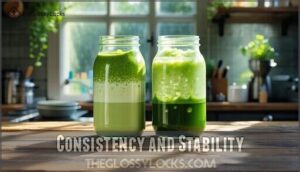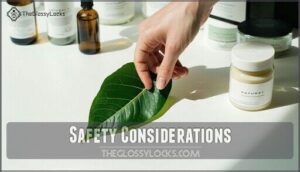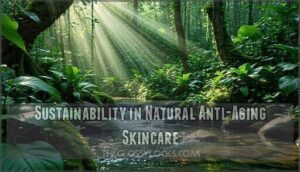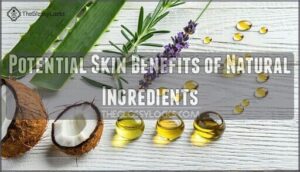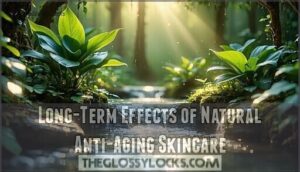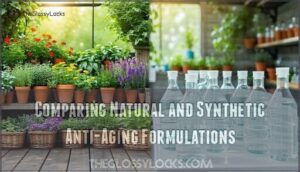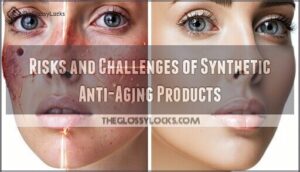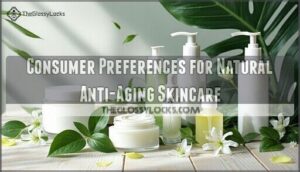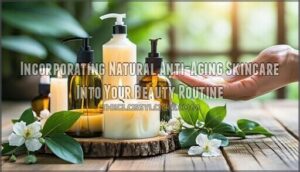This site is supported by our readers. We may earn a commission, at no cost to you, if you purchase through links.
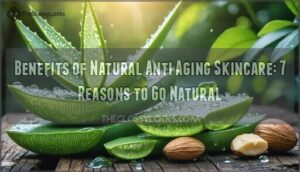 You’ll find the benefits of natural anti aging skincare over synthetic products are like choosing a home-cooked meal over fast food.
You’ll find the benefits of natural anti aging skincare over synthetic products are like choosing a home-cooked meal over fast food.
Natural ingredients work gently with your skin’s biology instead of forcing harsh changes. They’re packed with antioxidants and vitamins that nourish while they repair, reducing inflammation without the side effects synthetic alternatives often bring.
Your skin barrier stays stronger, and you won’t deal with mysterious chemical reactions or long-term damage from artificial preservatives. Plus, you’re supporting sustainable practices that don’t harm the environment.
Think of it as treating your skin like the delicate ecosystem it actually is – and that’s just scratching the surface.
Table Of Contents
- Key Takeaways
- Why Choose Natural Anti-Aging Skincare?
- Understanding Natural Anti-Aging Ingredients
- Effectiveness of Natural Vs. Synthetic Anti-Aging Products
- Sustainability in Natural Anti-Aging Skincare
- Potential Skin Benefits of Natural Ingredients
- Long-Term Effects of Natural Anti-Aging Skincare
- Comparing Natural and Synthetic Anti-Aging Formulations
- Risks and Challenges of Synthetic Anti-Aging Products
- Consumer Preferences for Natural Anti-Aging Skincare
- Incorporating Natural Anti-Aging Skincare Into Your Beauty Routine
- Frequently Asked Questions (FAQs)
- Why should you choose a natural alternative to synthetic skin care?
- What are the pros and cons of synthetic skincare?
- Are synthetic ingredients good for your skin?
- What are the benefits of natural skincare?
- Are ‘natural’ ingredients better than’synthetic’ ingredients?
- Why should you use synthetic actives?
- Why is natural better than synthetic?
- Are naturally derived products better than synthetic products?
- Why is natural skincare better?
- What is the difference between organic and synthetic skincare?
- Conclusion
Key Takeaways
- You’ll experience gentler results with natural ingredients that work with your skin’s biology instead of forcing harsh changes, reducing irritation and strengthening your skin barrier without mysterious chemical reactions.
- You’re getting powerful antioxidants and anti-inflammatory benefits from plant-based compounds like vitamin C, green tea, and rosehip oil that nourish while they repair, protecting against free radical damage more effectively than synthetic alternatives.
- You’re supporting environmental sustainability through biodegradable ingredients, ethical sourcing practices, and eco-friendly packaging that reduces pollution and conserves natural resources while caring for your skin.
- You’ll see long-term improvements as natural ingredients support your skin’s natural renewal processes, promoting cellular repair and collagen production without the potential side effects that harsh synthetic chemicals can cause over time.
Why Choose Natural Anti-Aging Skincare?
You’re probably tired of reading ingredient lists that sound like chemistry homework when all you want is healthier-looking skin.
Ditch the science experiment approach—your skin deserves ingredients you can actually pronounce and trust.
Natural anti-aging skincare offers plant-based compounds that work with your skin’s natural processes.
While avoiding harsh chemicals that can irritate sensitive skin is crucial, natural skincare provides a solution by using plant-based compounds.
Benefits of Natural Ingredients
The power of natural anti aging skincare lies in its gentle effectiveness.
You’ll find that plant-based ingredients deliver antioxidant protection without harsh chemicals that cause reduced irritation.
These botanical treasures provide exceptional skin nourishment through vitamins and minerals your skin craves.
Natural ingredients work harmoniously with your body’s processes, offering anti-inflammatory benefits that synthetic alternatives often can’t match.
When you choose natural skincare, you’re embracing ingredients that truly understand your skin’s needs while supporting environmental sustainability.
This approach to skincare not only benefits your skin but also promotes a healthier relationship between your body and the natural world, by using botanical treasures.
Environmental Impact
Natural anti-aging skincare delivers impressive environmental sustainability benefits beyond healthy skin.
Sustainable ingredients and ethical sourcing protect ecosystems while biodegradable ingredients break down safely in nature.
Eco-friendly packaging reduces waste, and pollution reduction comes from cleaner production methods.
When you choose sustainable beauty and eco friendly skincare, you’re supporting resource conservation and minimizing your environmental impact with every application.
Understanding Natural Anti-Aging Ingredients
You’ve likely wondered what makes natural anti-aging ingredients different from their synthetic counterparts, especially when both promise younger-looking skin.
Natural ingredients like vitamin C from citrus fruits and antioxidants from green tea work with your skin’s biology rather than against it, providing gentle yet effective results.
That won’t leave you looking like you wrestled with a chemistry set, which is a significant advantage of using natural ingredients.
Antioxidant Properties
Think of antioxidants as your skin’s personal bodyguards against aging. These plant-based antioxidants work overtime providing cellular protection from free radical damage that accelerates wrinkles and fine lines.
Natural anti-aging ingredients deliver powerful oxidative stress reduction through:
- Vitamin C from citrus and berries brightening complexion
- Green tea polyphenols preventing collagen breakdown
- Pomegranate extract boosting skin renewal
- Rosehip oil reducing age spots
- Grape seed extract strengthening skin barrier
Free radical defense becomes effortless with consistent use, leveraging the power of antioxidants and natural ingredients to promote healthy skin, ultimately leading to a more youthful appearance with reduced fine lines.
Anti-Inflammatory Benefits
Why settle for harsh chemicals when nature offers gentle healing?
Natural anti-inflammatory ingredients work like a soothing balm for your skin. These botanical powerhouses reduce redness and calm sensitivity through proven antiinflammatory mechanisms.
You’ll discover natural relief that supports your skin’s healing process without irritation.
Here’s how natural antiaging ingredients deliver inflammation reduction:
- Soothe irritation from environmental stressors
- Reduce redness and visible inflammation
- Calm sensitivity in reactive skin types
- Provide natural relief through gentle botanical compounds
Effectiveness of Natural Vs. Synthetic Anti-Aging Products
You’ve probably wondered whether that expensive synthetic serum actually works better than your grandmother’s favorite plant-based remedy.
The truth is that both natural and synthetic anti-aging products can be effective, but they work differently and offer distinct advantages depending on your skin’s needs and your personal values.
Consistency and Stability
Like comparing a fresh apple to a dried one, natural anti-aging ingredients face formulation shelf-life challenges that synthetic alternatives handle better.
You’ll notice ingredient degradation happens faster with natural preservatives than synthetic preservatives. Natural ingredients are often minimally processed to preserve inherent properties.
Here’s the reality check:
| Factor | Natural | Synthetic |
|---|---|---|
| Shelf Life | 6-12 months | 2-3 years |
| Consistency | Variable batches | Uniform quality |
| Stability | Temperature sensitive | Heat resistant |
Maintaining efficacy requires proper storage with natural alternatives, while ingredient stability remains predictable with lab-created compounds.
Safety Considerations
When choosing between natural and synthetic anti-aging products, safety considerations should guide your decision.
Natural ingredients typically present fewer allergy risks, but proper ingredient research remains essential.
Both product types require safe usage practices and attention to shelf life limitations.
Many consumers are now turning to clean skincare brands to avoid potentially harmful chemicals.
| Safety Factor | Natural vs Synthetic |
|---|---|
| Allergy Risks | Natural: Lower overall risk |
| Product Testing | Synthetic: More standardized |
| Ingredient Safety | Both require research |
| Shelf Life | Natural: Shorter duration |
Understanding these differences helps you make informed choices for your skincare routine.
Sustainability in Natural Anti-Aging Skincare
When you choose natural anti-aging skincare, you’re supporting farming practices that protect our planet’s resources and wildlife habitats.
Your skincare routine becomes part of a bigger picture that keeps ecosystems healthy while giving your skin the gentle care it deserves.
Responsible Sourcing Practices
Natural anti-aging skincare brands are transforming beauty through responsible sourcing practices that prioritize ethical trade and resource conservation.
You’re supporting supply chains that protect biodiversity while making eco-friendly choices for your skin.
By choosing brands committed to fair trade practices, consumers actively support improved worker welfare in ingredient-sourcing regions.
Here’s what ethical sourcing delivers:
- Fair wages for farming communities worldwide
- Transparent ingredient origins you can trust
- Sustainable harvesting that preserves ecosystems
- Quality assurance through verified sourcing transparency
Biodiversity Conservation
When you support natural anti-aging skincare, you’re championing biodiversity conservation that protects our planet’s precious ecosystems.
Ethical sourcing practices guarantee habitat preservation while maintaining genetic diversity in botanical ingredients. Sustainable agriculture methods used by responsible brands create a ripple effect of environmental protection.
Many brands now offer eco-friendly packaging options to further reduce waste.
Your skincare choices directly impact:
- Species protection through sustainable sourcing practices that avoid over-harvesting
- Habitat integrity preservation in biodiverse regions where ingredients are cultivated
- Natural resource conservation that supports long-term ecological balance.
This eco-tourism impact creates lasting environmental benefits for generations.
Potential Skin Benefits of Natural Ingredients
Natural ingredients work with your skin’s biology rather than against it, providing gentle nourishment that supports your skin’s natural repair processes.
Work with your skin’s natural wisdom instead of fighting against it with harsh chemicals.
You’ll find that plant-based compounds like aloe vera and coconut oil deliver antioxidants and essential nutrients without the harsh side effects that synthetic alternatives sometimes cause, which makes them a great option for those looking for a more natural approach with gentle nourishment.
Skin Nourishment and Hydration
Your skin craves the deep nourishment that Natural Hydrators like plant oils deliver.
These botanical treasures boost Cellular Hydration while maintaining perfect Moisture Balance.
Unlike harsh synthetics, natural ingredients work with your skin’s biology to enhance moisture retention and natural skin elasticity.
Many people now prefer to use natural skin solutions.
They’re like a rejuvenating drink for thirsty skin cells, providing lasting hydration without overwhelming your delicate Skin Barrier.
Skin Barrier Support
Beyond keeping your skin hydrated, natural ingredients excel at barrier repair and lipid protection.
Plant-based compounds like ceramides work with your skin’s natural structure, supporting microbiome balance while boosting hydration levels.
These natural anti inflammatory botanicals strengthen your protective shield without disruption.
Think of natural skin hydration as your skin’s security system – plantbased ingredients reinforce defenses while maintaining harmony with skin barrier support mechanisms.
Long-Term Effects of Natural Anti-Aging Skincare
When you commit to natural anti-aging skincare, you’re investing in your skin’s future health rather than chasing quick fixes that might backfire later.
Your skin learns to work with gentle plant-based compounds that support its natural renewal processes, creating lasting improvements that synthetic products often can’t match, which is a key aspect of lasting improvements.
Skin Renewal and Rejuvenation
When you embrace natural antiaging skincare, you’re giving your skin the ultimate renewal experience.
Plant-based ingredients work like tiny cellular coaches, encouraging your skin’s natural processes to kick into high gear.
Natural skin rejuvenation happens through these key mechanisms:
- Cell Turnover acceleration helps shed damaged skin cells faster
- Collagen Boost from phytoextracts strengthens your skin’s foundation
- Elasticity Improvement through bioactive compounds maintains bounce
- Hydration Levels increase as natural ingredients support moisture retention
natural-skincare-renewal
Delaying Signs of Aging
Time becomes your ally when you embrace natural antiaging skincare for delaying signs of aging.
Plant-based antioxidants target Fine Lines while promoting Cellular Repair and Skin Elasticity. These gentle formulas deliver a natural Collagen Boost without harsh chemicals, helping you maintain Youthful Radiance.
Professional natural wrinkle reduction products typically outperform DIY alternatives, though potential allergic reactions remain minimal with careful ingredient selection.
To further enhance your routine, consider incorporating products with key ingredients like retinol for overnight skin renewal.
Comparing Natural and Synthetic Anti-Aging Formulations
When you’re choosing between natural and synthetic anti-aging products, you’ll find that natural formulations offer greater flexibility to customize your routine while often proving more budget-friendly in the long run.
Natural ingredients let you mix and match botanical extracts to target your specific skin concerns, much like creating a personalized recipe for your face rather than following a one-size-fits-all approach, which allows for a more customized skincare routine.
Customizability
You can mix and match natural ingredients like a chef creating the perfect recipe.
DIY recipes give you complete ingredient control over what touches your skin.
Want to target dry patches and fine lines? Blend rosehip oil with vitamin E.
Need something gentle for sensitive areas? Personalized blends let you adjust concentrations for your unique needs.
This customizability beats one-size-fits-all synthetic products that can’t adapt to your changing skin type.
Cost-Effectiveness
From the get-go, natural skincare can look pricey, thanks to premium ingredient sourcing and packaging.
But dig a little deeper—long-term savings are real. You might notice fewer replacement buys as product lifespan stretches and DIY skincare options take center stage.
The initial price feels steep, but cost-effectiveness shines as you cut back on corrective treatments.
In practice, cost-conscious skincare is about value perception, not just picking the cheapest jar on the shelf.
Risks and Challenges of Synthetic Anti-Aging Products
You’ve probably noticed that fancy anti-aging cream left your skin redder than a sunburn after one use.
While synthetic products promise quick results, they often contain harsh chemicals that can irritate sensitive skin and leave you guessing what’s actually in that expensive bottle, which can be a significant concern for sensitive skin.
Skin Irritation and Sensitivity
Synthetic products can turn your skincare routine into a minefield of skin irritation and sensitivity.
Your face doesn’t need to become a testing ground for harsh chemicals. Here’s what you’re risking with synthetic anti-aging formulas:
- Allergic reactions that leave your skin red, swollen, and angry
- Chemical burns from potent acids that strip your protective barrier
- Chronic sensitivity that makes even gentle products feel like sandpaper
Patch testing helps identify irritants before they wreak havoc.
Natural ingredients offer soothing alternatives for sensitive skin.
Ingredient Transparency
Beyond skin irritation, synthetic products often hide behind confusing ingredient transparency issues.
You can’t easily verify ingredient origins or understand complex ingredient definitions on labels.
Label clarity becomes a guessing game when manufacturers avoid full disclosure.
Natural anti-aging skincare offers clearer source verification and ethical sourcing practices.
This ingredient awareness helps you make informed choices about what touches your skin daily.
Some ingredients, like harmful parabens, have links to hormone disruption.
Consumer Preferences for Natural Anti-Aging Skincare
You’re not alone if you’ve started reaching for skincare products with ingredient lists you can actually pronounce.
Today’s consumers increasingly prefer natural anti-aging skincare because it aligns with their values for clean beauty and environmental responsibility.
Growing Demand for Clean Beauty
You’re riding the wave of a massive shift in skincare preferences.
The clean beauty market exploded to $8.25 billion in 2023, with 59% of consumers now choosing natural ingredients over synthetic products.
Here’s what’s driving this transformation:
- Consumer education about harmful chemical effects
- Ingredient transparency demands from informed buyers
- Ethical sourcing concerns about environmental impact
- Sustainable packaging appeals to eco-conscious shoppers
- Minimalist formulas offer gentle yet effective solutions
Ethical and Eco-Friendly Choices
Clean beauty isn’t just about what you put on your skin—it’s about supporting brands that share your values.
When you choose natural anti-aging products, you’re voting for sustainable sourcing and cruelty-free beauty practices.
| Ethical Factor | Natural Brands | Conventional Brands |
|---|---|---|
| Cruelty-free testing | Standard practice | Often limited |
| Eco-friendly packaging | Recyclable materials | Plastic-heavy |
| Ingredient transparency | Full disclosure | Minimal information |
| Sustainable alternatives | Plant-based focus | Synthetic-heavy |
Your skincare routine becomes a statement about responsible sourcing and packaging sustainability.
Incorporating Natural Anti-Aging Skincare Into Your Beauty Routine
You don’t need to overhaul your entire beauty routine to enjoy natural anti-aging benefits.
Start by replacing one or two products with natural alternatives and research ingredients that work best for your skin type.
Daily Regimen Tips
Now that you’re ready to embrace natural skincare, let’s build your perfect daily regimen. Your skin type determines which natural ingredients work best for you.
Think of skincare routine as your daily self-care ritual that actually delivers results.
Here’s your foolproof natural anti-aging roadmap:
- Morning Routine: Cleanse gently, apply antioxidant serum, moisturize with botanical cream
- Evening Routine: Double cleanse, use restorative natural treatments overnight
- Sun Protection: Apply mineral SPF daily for ultimate anti-aging defense
- Product Layering: Start thin consistency, build to thicker natural formulas
Many people find a natural anti-aging serum beneficial for their skin.
Ingredient Awareness and Research
Knowing what you’re putting on your skin makes all the difference.
Research natural ingredients through scientific studies and trusted resources before buying. Read labels carefully to spot synthetic ingredients hiding in "natural" products.
Check for product certifications and research ingredient sourcing practices. Understanding allergy risks helps you choose safer natural alternatives that work with your skin.
Many people now seek plant based solutions for their skin.
Frequently Asked Questions (FAQs)
Why should you choose a natural alternative to synthetic skin care?
Like choosing a home-cooked meal over fast food, natural skincare nourishes your skin with gentle plant-based ingredients.
You’ll avoid harsh chemicals while supporting your skin’s natural healing processes and reducing environmental impact, which can be seen as a natural way to care for your skin and the environment.
What are the pros and cons of synthetic skincare?
You’ll find synthetic skincare offers consistency and longer shelf life with proven ingredients like retinol.
However, some formulas contain harsh chemicals that might irritate your skin or clog pores over time.
Are synthetic ingredients good for your skin?
Think of synthetic ingredients as skilled architects rebuilding your skin’s foundation.
They’re generally safe and effective when properly formulated.
Lab-created compounds like hyaluronic acid and peptides often provide consistent results with fewer allergens than natural alternatives, making them a consistent choice for skincare.
What are the benefits of natural skincare?
Natural skincare offers gentle effectiveness with plant-based ingredients that nourish your skin without harsh chemicals.
You’ll reduce irritation while getting antioxidants that combat aging. Plus, you’re supporting environmental sustainability through biodegradable, eco-friendly formulations.
Are ‘natural’ ingredients better than’synthetic’ ingredients?
Ironically, the "natural vs. synthetic" debate isn’t black and white.
You’ll find both can be equally effective and safe.
What matters most is choosing ingredients that work for your specific skin type and concerns.
Why should you use synthetic actives?
Synthetic actives deliver higher potency and stability than their natural counterparts. You’ll get consistent results with lab-engineered ingredients like retinol and hyaluronic acid that maintain effectiveness longer.
Why is natural better than synthetic?
You’ll find natural ingredients work with your skin’s biology rather than against it. They’re gentler, packed with antioxidants, and won’t disrupt your skin barrier like harsh chemicals can.
Are naturally derived products better than synthetic products?
Imagine discovering your favorite moisturizer contains lab-created hyaluronic acid that’s identical to what’s naturally in your skin.
Neither naturally derived nor synthetic products are inherently better—it’s about your specific skin needs and ingredient quality.
Why is natural skincare better?
You want to treat your skin like a garden—gentle and fuss-free.
Natural skincare skips harsh chemicals, uses plant-based ingredients, and works with your skin’s rhythm.
You’ll dodge irritation and keep your glow without complicated science experiments, by following a skincare approach that is gentle and natural.
What is the difference between organic and synthetic skincare?
Organic skincare uses plant-based ingredients without synthetic chemicals, while synthetic skincare contains lab-created compounds.
You’ll find organic products gentler but less stable, whereas synthetic versions offer consistent potency and longer shelf life.
Conclusion
Nature holds the blueprint for healthy aging, and your skincare choices reflect that wisdom.
The benefits of natural anti aging skincare over synthetic products become clear when you prioritize gentle nourishment over harsh intervention.
You’re investing in ingredients that work with your skin’s natural processes rather than against them.
Your complexion will thank you with improved texture, reduced irritation, and sustainable results.
Choose products that respect both your skin and the planet for lasting beauty.
- https://www.revivalabs.com/natural-vs-synthetic-skincare-understanding-the-pros-cons-and-sustainability-aspects/
- https://natureherb.world/what-is-good-for-me-natural-vs-synthetic-skincare-products-a-comprehensive-comparison/
- https://dpderm.com/blogs/news/are-there-benefits-to-natural-vs-synthetic-ingredients-in-skincare-products
- https://skdpharmaceuticals.com/natural-vs-synthetic-ingredients-whats-really-better-for-skincare/
- https://skinhealthfoundation.org/the-benefits-of-using-natural-products-over-synthetic-ones/



